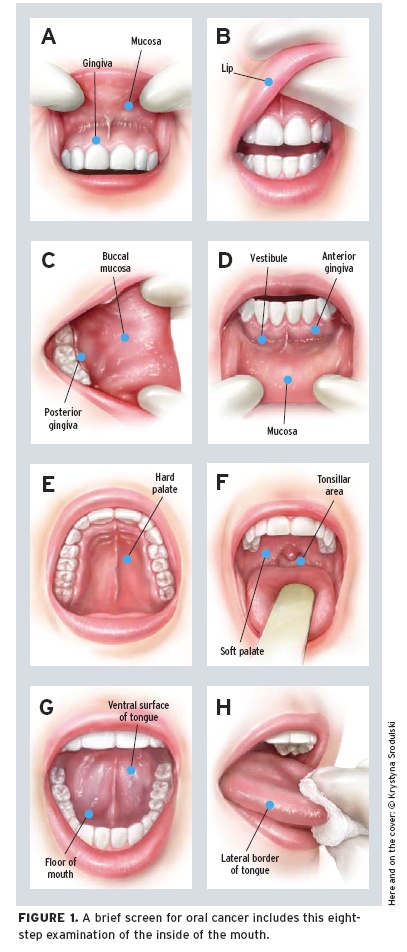Did you know that your routine six monthly dental health check should include a mouth cancer screening? There is unfortunately no national programme in the UK regarding screen for mouth cancer and it is down each individual to ensure they visit their dentist to be screened every six months.
As part of our oral healthcare information program we have written this blog post to answer your common questions about mouth/oral cancer.
First signs of mouth cancer.
There are a range of signs of mouth cancer which typically include things like:
- Mouth ulcers which don’t heal.
- Persistent discomfort or pain in your mouth.
- Read or white patches in and around your mouth or towards your throat.
- Lumps in your neck caused by enlarged lymph nodes.
- Difficulty in swallowing which may be accompanied by pain or burning sensation when chewing.
- Bad breath otherwise known as halitosis. Bad breath in itself is not a sign of mouth cancer but if you have cancer bad breath can be worse or more frequent than normal.
- A lump on/or thickening of your lip.
- Unusual numbness or bleeding in your mouth.
Checking for mouth cancer.
When your dentist undertakes your dental health check and includes a mouth cancer screening they will:
- Check inside of your mouth with the help of a small mirror.
- Look at your neck and underneath your jaw.
- Check to see if your lymph nodes are swollen.
- Observe your face and neck looking for swellings, skin abnormalities, moles and asymmetry.
- Look for any changes in colour or texture around the board of your lip.
- Visually examine your gums and the inside of your lips/cheek.
- Examine your tongue for changes in colour, texture, Mobility and symmetry.
- Move your tongue from either side to check underneath.
- Asked you to say “Ah” and check the back of your mouth and soft tissue areas.
We have also written a self examination guide for mouth cancer screening in Harrow, this can be downloaded here.
Free guide available for immediate download…
“7 Point Self Examination Guide for Oral Cancer”
One of the most important things with mouth cancer is early detection, so in this guide we will talk about how you can examine yourself at home, the risk factors for oral cancer and how you can lower them.Our guide is exclusively available by e-mail so please enter your details opposite for immediate access. Dr Nishan DixitBDS (Lond) 1994, LDS RCS (ENG) 1994 GDC Reg No. 70208 |
Mouth cancer prognosis.
The prognosis for mouth cancer depends largely upon how advanced your cancer is and the type of cancer that you have. It also depends upon exactly where your cancer is located. Cancer Research UK gives the following statistics.
Rates for individual mouth cancers include
- Lip cancer – nearly 90 out of 100 people diagnosed (89%) will live for 5 years or more
- Tongue cancer – 55 out of 100 women (55%) and 44 out of 100 men (44%) will live for 5 years or more
- Oral cavity – this includes all other mouth cancers (not lip or tongue) and nearly 55 out of every 100 women (55%) and 48 out of every 100 men (48%) will be alive 5 years later
The key with improving the prognosis for mouth cancer is early detection. The National Institute Of Dental and Craniofacial Research reports that A five-year survival rate for those with localised disease at diagnosis is 83% compared with only 32% of those whose cancer has spread to other parts of the body.
Steps you can take to lower the risk of mouth cancer.
There are various steps you can take to lower your risk of developing mouth cancer, these include:
- Monitoring your tobacco/alcohol use. Many cases of mouth cancer can be linked directly to smoking cigarettes.
- Be aware of transmitting sexually transmitted diseases. Human papillomavirus (specifically the HPV 16 type) have been linked also to the increased risk of developing mouth cancer.
- Exposure to the sun. You might think that you don’t sunbathe with your mouth open, so how can this increase your risk of mouth cancer? The reality is that mouth cancer can also happen on your lip , which does indeed come into contact with direct sunlight.
Mouth cancer treatment.
As we have already said the prognosis depends upon the type of cancer and how far advanced your cancer is. So long as your cancer has been detected early and hasn’t spread to other areas of your body then a complete cure may be possible with a combination of surgery, radiotherapy and chemotherapy.
Once again, the effectiveness of treatment really does depend on early detection.
The NHS has written an excellent introduction to the various treatments of mouth cancerincluding:
- Photodynamic therapy (PDT)
- Surgery
- Radiotherapy
- Chemotherapy
- Cetuximab
>> Read more about these treatments here
A patient’s experience of oral cancer
This gentleman gives a very positive story of oral cancer and how its early detection impacted him.
Blue Court Dental Centre are a local family dental practice in the heart of Harrow, Middlesex. As well as offering a range of dental treatments to the local people they also offer dental healthcare assessments including routine oral cancer screening.
Dr Nishan Dixit
Latest posts by Dr Nishan Dixit (see all)
- Dr Dixit is the new President of British Academy of Cosmetic Dentistry - 28 May 2020
- Does Invisalign hurt? - 9 March 2020
- How Long Does Invisalign Take? - 27 February 2020


